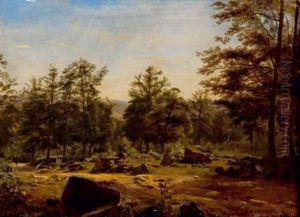Th. Fournois Paintings
Théodore Fourmois, often listed as Théodore Fournois, was a Belgian landscape painter and etcher born on October 14, 1836, in Presles, Belgium. His full name was Théodore-Louis-Joseph Fourmois. He is known for his meticulous landscape paintings which often included depictions of the Ardennes and the Campine, areas in Belgium known for their natural beauty.
Fourmois initially started his artistic education not as a painter but as a draftsman in the local industry in his hometown. Later, his interest in art led him to study under the landscape painter Michel Martin Drolling in Paris, where Fourmois was exposed to the French landscape tradition. This experience would have a significant impact on his stylistic development.
He returned to Belgium and began exhibiting his works at the Brussels Salon in 1857. Throughout his career, he was influenced by the Barbizon school, a mid-19th-century French art movement that emphasized the beauty of the countryside and rural life, and this was reflected in his choice of subjects and his naturalistic style.
In addition to his landscapes, Fourmois occasionally painted historical scenes and seascapes. His etchings and watercolors also show his versatility as an artist. He was a diligent and prolific artist, and his works were recognized with critical acclaim. He traveled extensively within Belgium, searching for inspiration, and these journeys helped him to produce a body of work that was both varied and authentic in its representation of the Belgian landscape.
Fourmois taught at the Académie Royale des Beaux-Arts in Brussels, where he influenced a new generation of Belgian artists. His works were popular with collectors during his lifetime, and his paintings can still be seen in museums and galleries in Belgium and beyond.
Théodore Fourmois passed away on October 1, 1900, in Brussels. His contribution to Belgian landscape painting remains significant, as he helped to capture the essence of the Belgian countryside during a period of great change and industrialization. His work continues to be appreciated for its technical skill and its evocative portrayal of rural life.
